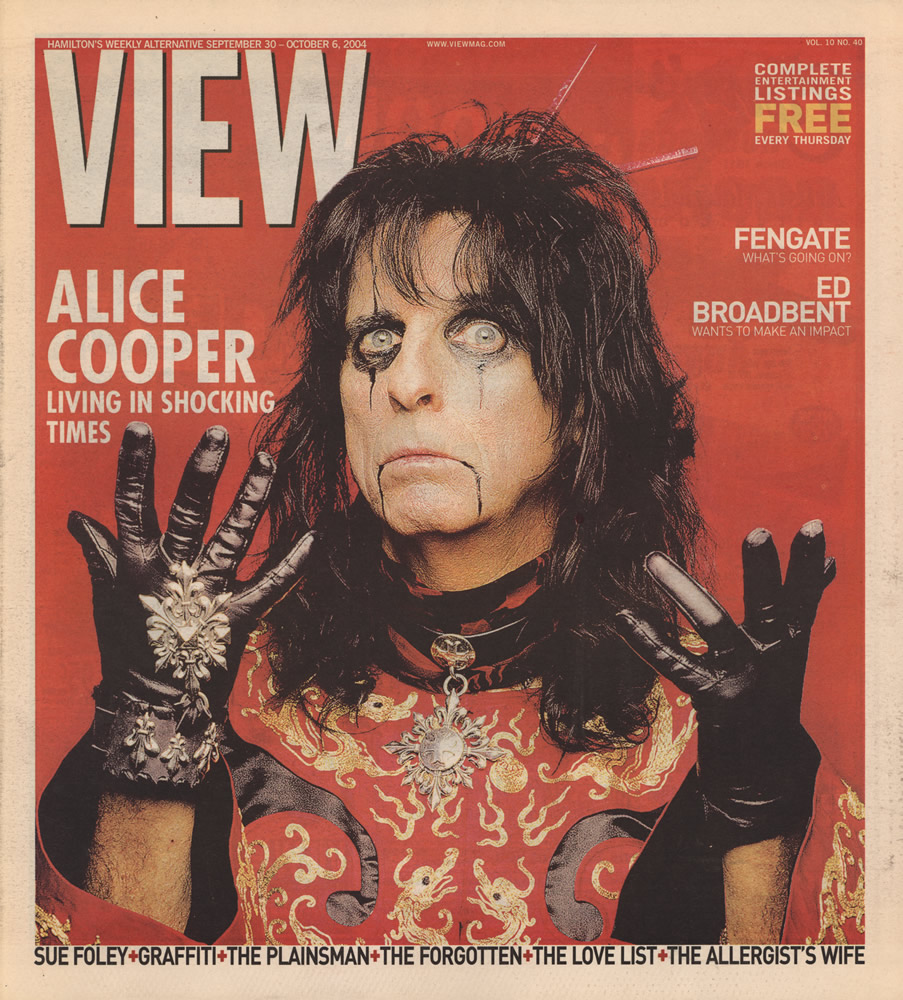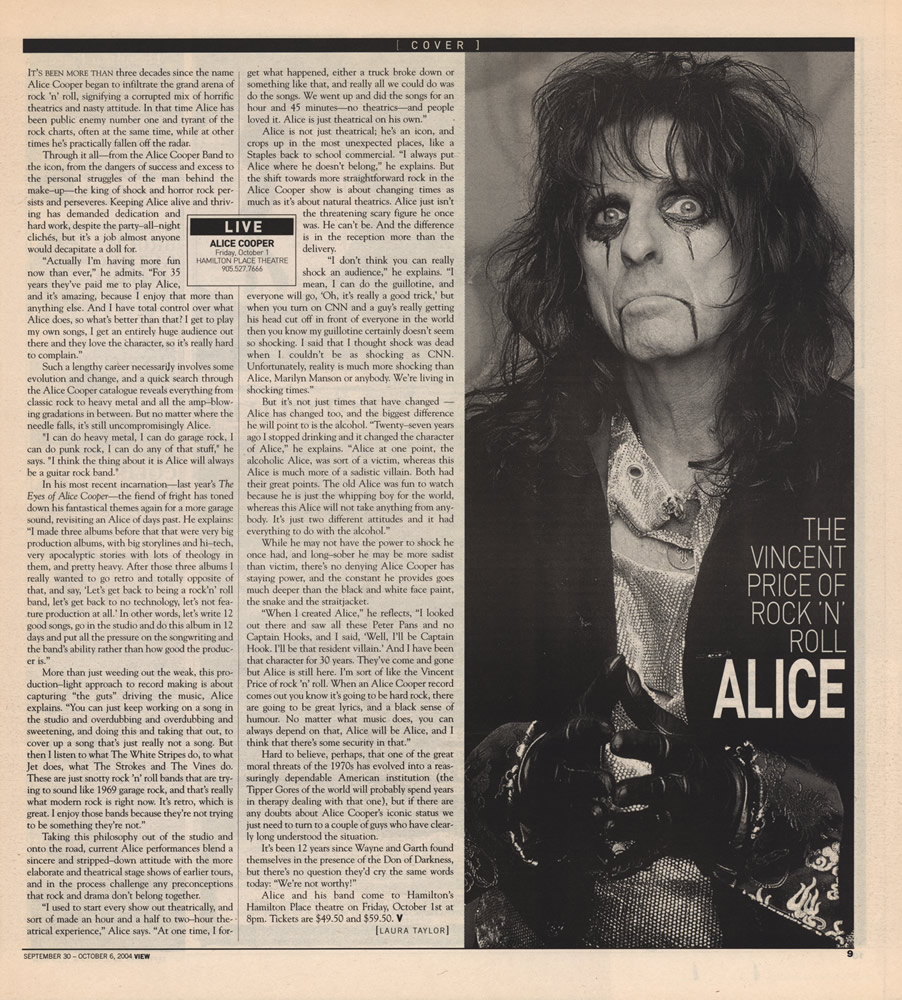Article Database
The Vincent Price of Rock'n'Roll
ALICE COOPER
Friday, October 1
HAMILTON PLACE THEATRE
IT'S BEEN MORE THAN three decades since the name Alice Cooper began to infiltrate the grand arena of rock 'n' roll, signifying a corrupted mix of horrific theatrics and nasty attitude. In that time Alice has been public enemy number one and tyrant of the rock charts, often at the same time, while at other times he's practically fallen off the radar.
Through it all — from the Alice Cooper Band to the icon, from the dangers of success and excess to the personal struggles of the man behind the make-up — the king of shock and horror rock persists and perseveres. Keeping Alice alive and thriving has demanded dedication and hard work, despite the party-all-night cliches, but it's a job almost anyone would decapitate a doll for.
"Actually I'm having more fun now than ever," he admits. "For 35 years they've paid me to play Alice, and it's amazing, because I enjoy that more than anything else. And I have total control over what Alice does, so what's better than that? I get to play my own songs, I get an entirely huge audience out there and they love the character, so it's really hard to complain."
Such a lengthy career necessarily involves some evolution and change, and a quick search through the Alice Cooper catalogue reveals everything from classic rock to heavy metal and all the amp-blowing gradations in between. But no matter where the needle falls, it's still uncompromisingly Alice.
"I can do heavy metal, I can do garage rock, I can do punk rock, I can do any of that stuff," he says. "I think the thing about it is Alice will always be a guitar rock band."
In his most recent incarnation — last year's The Eyes of Alice Cooper — the fiend of fright has toned down his fantastical themes again for a more garage sound, revisiting an Alice of days past. He explains: "I made three albums before that that were very big production albums, with big storylines and hi-tech, very apocalyptic stories with lots of theology in them, and pretty heavy. After those three albums I really wanted to go retro and totally opposite of that, and say, 'Let's get back to being a rock'n' roll band, let's get back to no technology, let's not feature production at all.' In other words, let's write 12 good songs, go in the studio and do this album in 12 days and put all the pressure on the songwriting and the band's ability rather than how good the producer is."
More than just weeding out the weak, this production-light approach to record making is about capturing "the guts" driving the music, Alice explains. "You can just keep working on a song in the studio and overdubbing and overdubbing and sweetening, and doing this and taking that out, to cover up a song that's just really not a song. But then I listen to what The White Stripes do, to what Jet does, what The Strokes and The Vines do. These are just snotty rock 'n' roll bands that are trying to sound like 1969 garage rock, and that's really what modem rock is right now. It's retro, which is great. I enjoy those bands because they're not trying to be something they're not."
Taking this philosophy out of the studio and onto the road, current Alice performances blend a sincere and stripped-down attitude with the more elaborate and theatrical stage shows of earlier tours, and in the process challenge any preconceptions that rock and drama don't belong together.
"I used to start every show out theatrically, and sort of made an hour and a half to two-hour theatrical experience," Alice says. "At one time, I forget what happened, either a truck broke down or something like that, and really all we could do was do the songs. We went up and did the songs for an hour and 45 minutes — no theatrics — and people loved it. Alice is just theatrical on his own."
Alice is not just theatrical; he's an icon, and crops up in the most unexpected places, like a Staples back to school commercial. "I always put Alice where he doesn't belong," he explains. But the shift towards more straightforward rock in the Alice Cooper show is about changing times as much as it's about natural theatrics. Alice just isn't the threatening scary figure he once was. He can't be. And the difference is in the reception more than the delivery.
"I don't think you can really shock an audience," he explains. "I mean, I can do the guillotine, and everyone will go, 'Oh, it's really a good trick,' but when you turn on CNN and a guy's really getting his head cut off in front of everyone in the world then you know my guillotine certainly doesn't seem so shocking. I said that I thought shock was dead when I couldn't be as shocking as CNN. Unfortunately, reality is much more shocking than Alice, Marilyn Manson or anybody. We're living in shocking times."
But it's not just times that have changed — Alice has changed too, and the biggest difference he will point to is the alcohol. "Twenty-seven years ago I stopped drinking and it changed the character of Alice," he explains. "Alice at one point, the alcoholic Alice, was sort of a victim, whereas this Alice is much more of a sadistic villain. Both had their great points. The old Alice was fun to watch because he is just the whipping boy for the world, whereas this Alice will not take anything from anybody. It's just two different attitudes and it had everything to do with the alcohol."
While he may not have the power to shock he once had, and long-sober he may be more sadist than victim, there's no denying Alice Cooper has staying power, and the constant he provides goes much deeper than the black and white face paint, the snake and the straitjacket.
"When I created Alice," he reflects, "I looked out there and saw all these Peter Pans and no Captain Hooks, and I said, 'Well, I'll be Captain Hook. I'll be that resident villain.' And I have been that character for 30 years. They've come and gone but Alice is still here. I'm sort of like the Vincent Price of rock 'n' roll. When an Alice Cooper record comes out you know it's going to be hard rock, there are going to be great lyrics, and a black sense of humour. No matter what music does, you can always depend on that, Alice will be Alice, and I think that there's some security in that."
Hard to believe, perhaps, that one of the great moral threats of the 1970s has evolved into a reassuringly dependable American institution (the Tipper Gores of the world will probably spend years in therapy dealing with that one), but if there are any doubts about Alice Cooper's iconic status we just need to turn to a couple of guys who have clearly long understood the situation.
It's been 12 years since Wayne and Garth found themselves in the presence of the Don of Darkness, but there's no question they'd cry the same words today: "We're not worthy!"
Alice and his band come to Hamilton's Hamilton Place theatre on Friday, October 1st at 8pm. Tickets are $49.50 and $59.50.
(Originally published in View, Hamilton's Weekly Alternative, September 30 - October 6, 2004 - Volume 10, Number 40)





